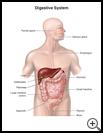
Irritable Bowel Syndrome: Brief Version
________________________________________________________________________
KEY POINTS
- Irritable bowel syndrome (IBS) is a common problem of the large intestine (colon). It can be painful, but it does not damage the intestine or cause death.
- You may try a special diet to see if certain foods are causing your symptoms. Keep a food diary and try to find ways to lower the stress in your life.
- Be sure to follow your healthcare provider's advice. See your provider if your symptoms are getting worse or you are having them more often.
________________________________________________________________________
What is irritable bowel syndrome?
Irritable bowel syndrome (IBS) is a common problem of the large intestine (colon). It can be painful. But it does not damage the intestine or cause death.
What is the cause?
We don't know why IBS happens. Most of the symptoms of IBS come from painful muscle spasms of the lower colon. Sometimes IBS slows down bowel movements and causes constipation. It may also speed up bowel movements and cause diarrhea.
For some people some foods may cause attacks of IBS. Stress can also bring on symptoms of IBS.
What are the symptoms?
You may:
- Have painful cramping in your belly
- Have diarrhea or have trouble having a bowel movement (constipation)
- Have a lot of gas
Other things to watch for are:
- Bloating
- A feeling of fullness in the rectum
You may have these symptoms after you've eaten a big meal or when you feel stressed. You may feel better after you have a bowel movement.
How is it treated?
There is no cure for IBS. However, to try to manage your symptoms, it helps to:
- Eat the right foods.
- You may try a special diet to see if certain foods are causing your symptoms. For example, your provider may ask you to see what happens if you don’t eat or drink any foods made from milk.
- Talk to your healthcare provider about whether you should eat more or less high-fiber food.
- Don’t eat foods that make you have gas, like sodas (pop), cabbage, or beans.
- Keep a food diary.
Write down the foods you are eating and how you feel after you eat them. You may find that when you eat some kinds of food, you feel worse. When you learn what these foods are, you can avoid them.
- Find ways to lower stress in your life.
Think about what causes stress for you. Get help for managing stress. Try different ways to take care of stress, such as yoga, meditation, counseling, and exercise.
- Take the medicines your healthcare provider says will help.
You may need medicines that give your body more fiber, help prevent spasms, or relieve stress.
How can I take care of myself?
Be sure to follow your healthcare provider's advice. Here are other things you can do:
- Find ways to have less stress in your life. It can help to talk to a counselor.
- Drink plenty of water.
- Don’t drink alcohol. It can make your symptoms worse.
- Choose your food with care. If you find that certain food brings on your symptoms every time you eat it, stay away from it.
- Eat smaller meals more often. For example, eat 4 to 6 small meals a day rather than 3 large ones.
- Ask your provider for an exercise program. Exercise can help keep your bowels regular. It can also help you lower your stress.
- See your provider if your symptoms are getting worse or are happening more often.

